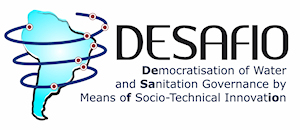3.1 Ethnographic Assessment of the SISAR Model
This research was one of the three components of the case study focused on the Integrated Rural Sanitation System (SISAR) implemented in the State of Ceara, Brazil. The other two components are the Political-institutional evaluation of the SISAR model, Ceara, Brazil, and the Community Oriented Water and Sanitation System in a Rural Community in North East Brazil.
This component consisted of an ethnographic study of the SISAR model. It focused on key aspects of community participation in the management of the system in the communities of Arataca and Andreza in the State of Ceará, in the Brazilian northeast. We analysed the socio-political and cultural and the political-institutional factors and processes that shape the ways in which water resources and WSS are governed and managed in the context of this model. We carried out the study before, during and after the construction of a water and sanitation system in the community in order to cover the different stages of the project. We centred our attention on the processes that condition or influence the community’s behaviour in relation to and the factors and practices that contribute to the replicability and long-term sustainability of the system.
This study was conducted by Colin Brown, during his stage as a visiting student at the Federal University of Minas Gerais (UFMG), Belo Horizonte, Brazil. At UFMG Brown counted with the support of Prof Léo Heller, Dr Sonaly Rezende, and Dr João Luiz Pena. The study involved close interaction with Ceara’s Water and Sanitation Company (CAGECE), which created and supports the management of SISAR. CAGECE was a research partner in DESAFIO. Brown’s visit was part of his Master studies in Environmental Politics and Social Practices at the Université Toulouse Jean Jaurès, France, which he successfully completed in 2014. The title of his Master dissertation was “Un Systeme Communautaire de la Gestion de la Ressource en Eau: Approche Sociotechnique de L’Innovation”.
The report for this component of the case study has now been published as:
Brown, C. (2015), “Ethnographic assessment of the SISAR model – Report D3.1”, in J. E. Castro (Ed.), “The Integrated Rural Sanitation System (SISAR) in Brazil”, WATERLAT-GOBACIT Working Papers, DESAFIO Project Series SPIDES, Vol. 2, No 6, pp. 78-161. Download it here.















